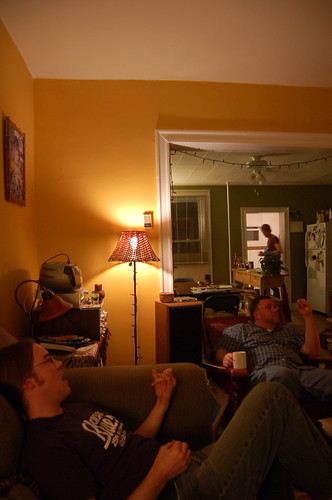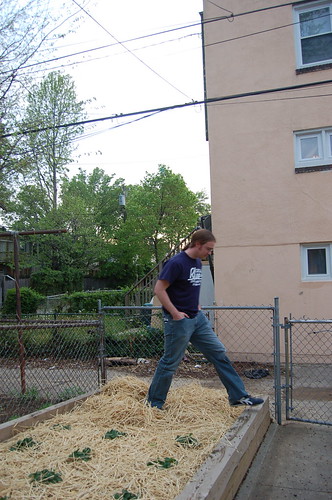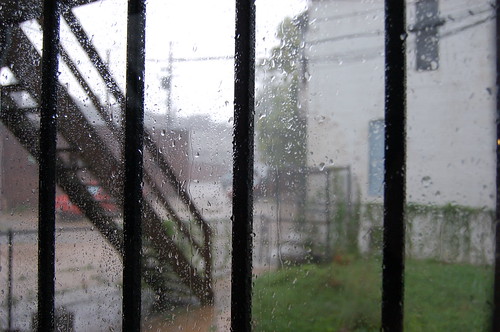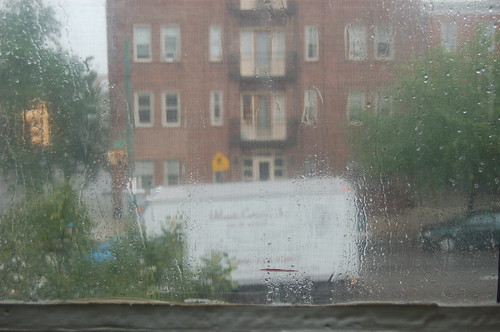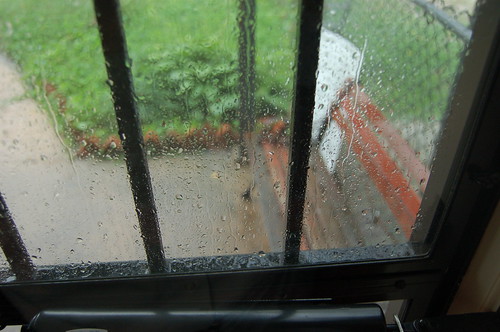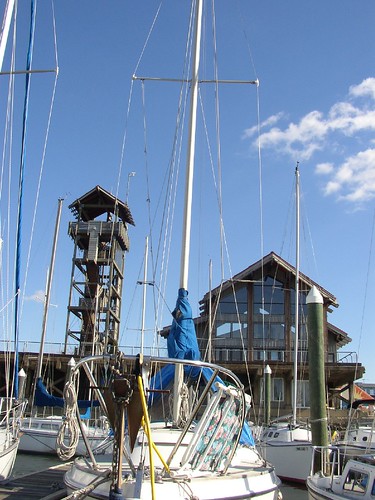…month draws to a close. (If I threw in something about bangs and whimpers here, I could have an almost perfectly pretentious and lazy opening. What would make it a trifecta? Something about a shape with lion body and the head of a man?)
As it turned out, I did get some work done this weekend, although not as much as I’d hoped. I spent most of Saturday morning procrastinating getting organized by checking out organizational and anti-procrastination tools online, and so I only managed an hour or two of paper-editing in the afternoon. Then, on Sunday morning, I was busy with the Notebook and with researching the situation in Estonia. I squeezed in another hour or two of paper-editing that afternoon, but then decided to head out and enjoy the perfectly cool, perfectly sunny, early-spring day. The leisurely drive I ended up taking — windows down, car clunking solidly over potholes in the reassuring way that only a large American car can, the sun warm on my arm where it rested on the windowsill, a classic rock station playing “rock blocks” on the radio — lasted longer than planned. I tried to work for a few more hours after The Simpsons, but hit the wall by eleven. At least I got up for a run this morning. That’s only about the fifth time this year, but I’ll take my victories where I can get them.
“What luxury!” my brother called from the kitchen yesterday afternoon. I was sitting at my computer at the dining room table. Of course. He was referring to the now gushing cold water available from the kitchen sink, where once — prior to the plumbers’ Saturday visit, that is — there was only a trickle. Strange, the difference a little improvement like this can make. And, frankly, it does feel like luxury to be able to fill a water bottle quickly, as he was doing, as well as to have a continually topped-off Brita pitcher. (Before, the prospect of waiting the 3-5 minutes necessary to refill it a glass’s worth was unpleasant enough that it often never happened, meaning that the pitcher was sometimes to be found empty in the refrigerator, just a well-chilled piece of clear plastic.) In other words, I’m glad, as A. kept predicting I would be, to have gotten the repair made while I will still be here for a while to enjoy it. Now if only the hot water in the bathroom would start working. To fix it would involve the $800-1,000 job I mentioned before. Jimmy the plumber did suggest that, if I turned the hot water on and off enough times, the fluctuating pressure might dislodge a chunk of whatever is clogging the pipe, although the emphasis seemed to be on might. Hope springs and all that, so I do find myself trying this at least a few times every time I’m in the bathroom, as silly as it feels. We all need our rituals.
Saturday, I made a rare grocery order through Safeway.com that was delivered on Sunday morning, which, if anything is going to make you feel like a solid citizen, that will: standing in the doorway of your villa, receiving provisions from the shop in town, lord of all you survey, jodphurs bulging out of your shiny boots. The spell is broken when you discover that the delivery driver won’t take a tip, even if you thwack your thigh with your riding crop and say “now see here!” Hard to feel superior to someone who won’t take your money, an idea politicians have trouble with.
When I’d placed the order, choosing the items based on names and descriptions and tiny postage-stamp-sized pictures on the web site, I had apparently selected a box of dry laundry detergent approximately the size of a large cinder block. In the evening, I started a load of colors, taking my time, doing everything meticulously, dare I say mindfully? Yes, it’s true, I was centered on the here and now (there and then?) like a Zen priest raking sand. I carefully separated the colors and the whites while I let the water fill most of the way up and form a good head of suds. Then I stirred in the laundry, distributing things evenly. I like taking my time doing little chores like this. It makes me feel grounded and attentive and grown up, good feelings to be able to fall back on when the weight of the months apart piles up and the black dog comes nudging.
(Yes, you just read about me doing my laundry. It’s not my fault, though. No one’s making you.)
A. checked in around 9:00 p.m. from outside of a bowling alley in Payson, about 50 miles from Happy Jack, which is to say right around the corner in Western terms. She and the core members of the field crew were there to celebrate a birthday. She reports that the camp is all set up — “neatly,” as she made sure to mention, or maybe she used the word “orderly.” The rest of the two dozen or so seasonal researchers will trickle in over the next couple of weeks. Meanwhile there are a few problems to attend to. Part of the research performed on this project takes place in fenced enclosures out in the wilds of the Coconino National Forest. The fences are intended to exclude large land animals, I suppose to protect the research (A.: what’s going on in the enclosures, anyway?); as such, no sources of water are enclosed, and so an animal that does get inside stands a good chance of thirsting to death. This almost happened last year when an elk found its way (probably by jumping; these things can grab a startling amount of air) into one of the enclosures. It was a several day project — eventually involving Forest Service law enforcement rangers — to coax the panicked, dying animal out to safety, with one of the rangers getting kicked in the process, I think.
Anyway, in an initial visit to one of the enclosures in the last few days, A. and her team found that a massive ponderosa had fallen on the fence. I believe she mentioned that there was at least one elk inside already, although our conversation got sidetracked and I didn’t hear any further details on this elk. The tree’s trunk is at least 1.5 meters thick, A. reports, making it unlikely that they will be able to cut it up with their own chainsaw. “We’ll probably have to hire a contractor,” she said, although I’m not sure if that will just be for the tree or for repairing the fence, too, fence-stringing being something of an art, from what I understand.
When I went up to bed, I discovered that the light in the bathroom wasn’t working. For some reason, my first instinct was to hit the test button on the ground-fault interrupting (GFI) socket, which is on the same line as the light fixture. The reset button popped out but wouldn’t go back in. I unscrewed the dome from the light fixture and discovered that the bulb was burned out; nothing to do with the GFI at all. But that doesn’t change the fact that the GFI still won’t reset, which means that the light fixture still won’t work, new bulb or no, not to mention that my electric shaver can’t recharge. The horror… The electrician is coming back this Thursday, so I think I’ll just tough it out until then (the skylight makes this easier than it would be otherwise). But what the hell? Is this some side-effect of the work that was just done, which included putting another GFI on the same line (in the hallway)? Does the presence of two GFIs mean that I need to reset them in some particular order? While standing on one foot and rubbing my stomach? Or is it just coincidence?
And, most importantly, how much fun will it be to get calls about stuff like this from our tenants, whoever they are, when we are 2,500 miles away in Montana? I’m leaning more and more toward hiring a local property manager, not least because of my reading of local law that it’s required for absentee landlords, with offenses punishable by a $500/day fine. (Incredible that no one we’ve talked to about doing this rental has yet mentioned this law, but I guess you would only know about it if you yourself had been an absentee landlord.)
Anyway, in a city with as byzantine and oft-ignored a set of landlording laws as Baltimore, I get the feeling that slapping a $500/day fine on this particular offense is their way of signalling that this is one regulation they’d really like you to pay attention to. I hear you, Baltimore City Housing Code, I hear you.





